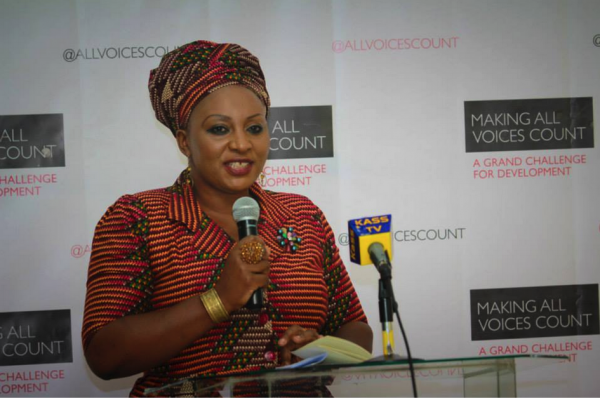With just over a month to go until the final of this year’s Global Innovation Competition (GIC), Making All Voices Count this week announced the 10 exciting finalists who will join us for the finals in Jakarta, Indonesia.
On April 16th, at the end of a week of intensive mentoring in Jakarta, the finalists will showcase their ideas for the GIC Jury, who are all leaders in the governance, technology and development fields – and who will select the winners.
The complete Global Innovation Competition Jury will be announced on Monday, 9th March, but today we are very pleased to announce Dr. Sheila Ochugboju as our Jury chair for the GIC 2015.
In preparation for the GIC week, we asked Dr. Ochugboju how she sees innovation changing the way governments interact with citizens, and what advice she has drawn on in her own career.
What was the best advice you were given in your life?
My mother told me to ignore my rigid headmistress who said I didn’t have a scientific brain, and should therefore not consider choosing science, but rather pursue a career in the arts. She said: “Whatever kind of brain you’ve got, you can make it do whatever you want in life. You are the master of your brain, not the other way around.”
When I went on to successfully complete my research for a Ph.D in Plant Biochemistry by the time I was 25, I realised she was totally right. And so was my headmistress! Maybe I am essentially a creative at heart, but I also learned to discipline my mind to rigour.
How do you see innovations changing the way governments interact with citizens?
The kind of innovations supported by the Making All Voices Count process are definitely changing the way governments interact with citizens.
They “give voice” to “voiceless” communities and amplify the voices of those who struggle to speak out; or they simply shed light on the fault lines that run through failing institutions, processes and systems governance. This is important for those of us who live and work in the developing world.
What initially happens is the rush of power that comes from just knowing you are not alone in your problem – that others share your concerns and passion for change around the world. Then there’s the incremental increase of knowledge that occurs faster now, in this digital space through the mediation of different technologies, which turns your little grain of knowledge into a pearl of wisdom, which can later unlock solutions to intransigent problems.
Finally, empowered by a maturing knowledge base, supported by an expanding community – the Making All Voices Count innovators are now able to touch pressure points that critically question the viability of the social compact between government and its citizens. Innovators ask government – what are they doing to provide for basic needs and aspirations? And can they go beyond just that to create even better opportunities for inclusive, sustainable growth?
These are all revolutionary innovations; baby steps, pinpricks of light, maybe… but still together they have the power to expose those who are wielding power without conscience or due care for their citizens.
Dr. Sheila Ochugboju is a development professional specialising in science, economics and policy development in Africa. She founded the Kenyan-based media and photography consultancy Africaknows, which ‘re-brands’ Africa by “telling a different story” with words and pictures, and is a TED fellow, curating the annual flagship event TEDxNairobi.
After gaining her PhD in Biochemistry from London University, Dr. Ochugboju became a Daphne Jackson Trust Post-Doctoral Research Fellow at St Hilda’s College, Oxford. She went on to specialise in scientific administration and communication and, among other key roles, she served as the Chief Communications Officer for the African Center for Economic Transformation (ACET), providing policy research and advisory services that support sustained growth and economic transformation for African governments.
Dr. Ochugboju also brings a wealth of programme leadership mentoring experience to her role as Jury Chair, engaging over 930 leaders across 19 countries in sub-Saharan Africa, Egypt, Jordan, Pakistan and the UK through her work as a lead Facilitator for the British Council’s InterAction Leadership programme. She has also been a Director for the Global Women Inventors & Innovators Network (GWINN) in the UK and has contributed to the IBM Global Innovation Outlook for Africa (GIO 3.0).
